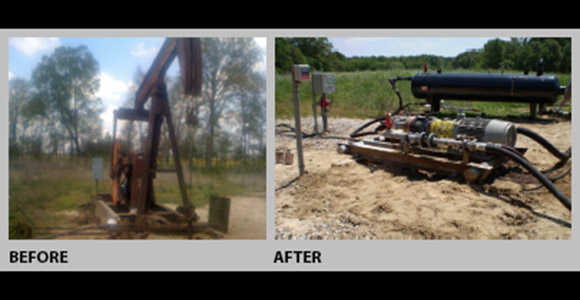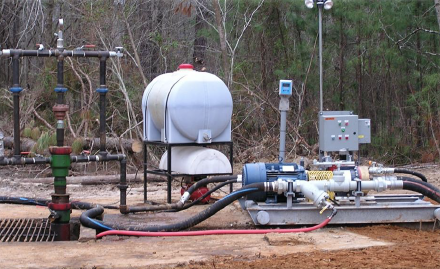Artificial Lift System for Horizontal or Deviated Wellbores
When a wellbore is crooked or deviated, the working life of most artificial lift systems is drastically shorter due to excessive wear on the moving (reciprocating or rotating) components. While other forms of artificial lift are subject to damage during installation in deviated wellbores, JJ Tech hydraulic jet pumps have no moving parts downhole, therefore downtime is greatly reduced.
Reduce Costs and Increase Oil and Gas Well Production
JJ Tech employs a combination of patented technologies to provide a tailored artificial lift solution designed to improve production and significantly lower overall operating costs over the life of your well.
SELECT-JET Pumps
Our unique design and manufacturing process results in best-in-class, efficient lift performance. Operators have the flexibility to place it in wells where other forms of artificial lift can’t operate.

Hydra-Cell Pro Diaphragm Pumps
The seal-less, packing-free design ensures a reliable, efficient way to power the JJ Tech jet pump.

Hydraulic Jet Pump Design & Optimization App
Using the actual surface and subsurface data from your oil or gas well, our Hydraulic Jet Pump Design & Optimization App lets you plot current jet pump performance and optimize for the future. Our app ensures the downhole jet pump is operating as efficiently as possible, thus maximizing overall production levels.
The Challenge
Horizontally or directionally drilled wells, and “deviated” or “crooked” well bores, can limit the performance or life cycle of many forms of artificial lift systems.
JJ Tech Jet Pump Solution
The JJ Tech artificial lift solution uses a hydraulically powered downhole jet pump, powered by a Hydra-Cell diaphragm pump on the surface. Since there is no mechanical connection from the Hydra-Cell pump to the downhole jet pump, the JJ Tech solution has proven reliable in highly deviated holes and deep vertical completions. Hydra-Cell diaphragm pumps cost less to operate than conventional triplex plunger pumps. Hydra-Cell Pumps are also environmentally friendly (no VOC emissions) and are significantly more efficient than multistage centrifugal pumps (H-Pumps).
Outperforms Other Solutions
Electric Submersible Pumps (ESP): Installing an ESP in a highly deviated wellbore poses challenges. ESPs can be very long (60 feet or longer) and have little to no bending tolerance during Installation or Operation. Also, power cables that run from the ESP to the surface can be damaged during installation which can often cause premature failures to the system. Since the JJ Tech SELECT-JET Pump is less than 5 feet in length and requires no mechanical connection from the surface to the down-hole pump, jet pumps can operate for years without the need for well intervention.
Rod Lift and Progressive Cavity Pumps: Rod lift is the most popular form of artificial lift and works great when in a good vertical completion. When wellbores are not perfectly straight, there is high sucker or drive rod friction because of the inclination. This metal-to-metal wear (reciprocating or rotating) causes premature rod failures. Progressive cavity pumps also use sucker rods, but rod and tubing wear is caused from rotating friction, as opposed to reciprocating. Jet pumps have no mechanical connection from the surface to the downhole pump therefore this type of wear is eliminated.
Gas Lift: Gas lift also requires no mechanical connection from the surface to the downhole components allowing it to work well inside deviated wellbores. The need for large volumes of gas and gas pipeline infrastructure can make gas lift cost-prohibitive. Also, back pressure is applied to the formation when operating which limits the amount of drawdown that can be achieved.
Jet Pump Systems: Several artificial lift providers offer hydraulic jet pump systems. These providers typically power their downhole jet pump using conventional triplex plunger pumps or H-Pumps. JJ Tech’s patented jet pump systems incorporate Hydra-Cell® Pro positive displacement diaphragm pumps.
Plunger Pump Powered Systems require external lubrication for plungers, which is costly and can also damage the environment if not properly contained. “Packed” plunger pumps also can threaten the environment if not properly maintained. Neither of these pump deficiencies are associated with the “ESG Friendly” Hydra-Cell diaphragm pump, which makes it the best choice for powering a hydraulic jet pump.
H-Pump Powered Systems do not pose the potential environmental issues of plunger pumps, but the low operating efficiency of H-Pumps can increase power consumption (electricity usage) by 30-40% as compared to the Hydra-Cell powered system. H-Pumps also require a larger footprint than a comparable Hydra-Cell unit.
100 HP Hydra-Cell = H-Pump 150 HP Electric Motor
200 HP Hydra-Cell = H-Pump 300 HP Electric Motor
330 HP Hydra-Cell = H-Pump 500 HP Electric Motor
Jet Pump Advantages
Greater Reliability
With no moving parts, JJ Tech jet jumps produce wells with sand or solids with far less damage potential to the downhole pump. If, over time, jet pump parts do become worn, a workover rig is not needed for replacement.
Reduced Workover Costs
With a JJ Tech jet pump, three- to five-year run times between workovers is not uncommon. Our jet pump systems also allow for chemical treatment for tubing and casing on a continual basis.
Increased Production
A JJ Tech jet pump can also provide increased production when other forms of lift are unable to provide the desired drawdown on a producing formation.
Related Case Studies
TALK TO AN EXPERT
Our team of experts specialize in resolving your challenging oil and gas well production problems. Talk to JJ Tech about analyzing your well at no cost and let us show you how we can help optimize your well production and lower your operating costs.



